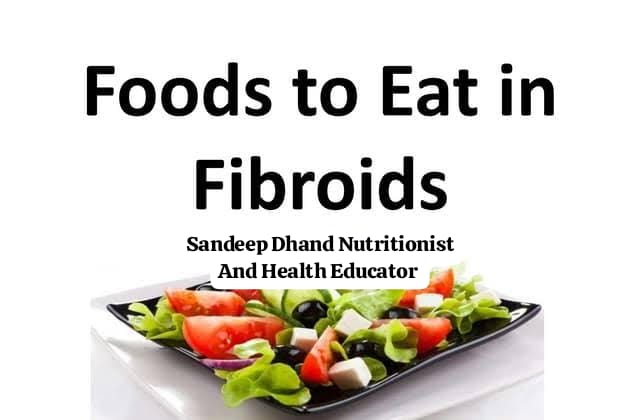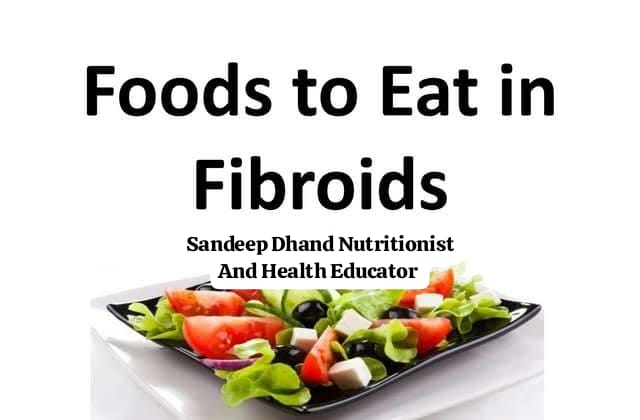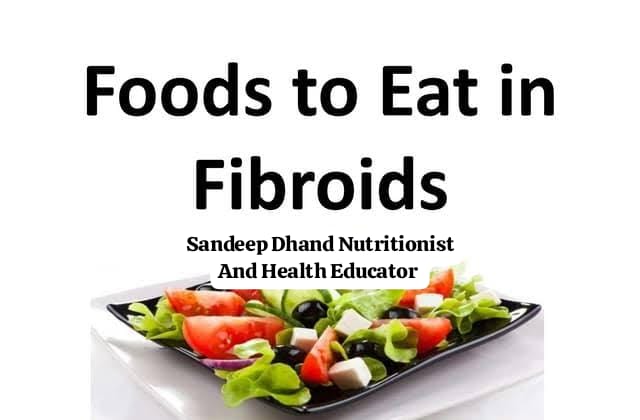Sandeep Dhand
Nutritionist And Health Educator
Uterine fibroids are influenced by hormonal imbalances, particularly high levels of estrogen. While diet alone cannot eliminate fibroids, eating the right foods can help manage symptoms, reduce inflammation, and balance hormones. Here’s a comprehensive diet plan to support women dealing with uterine fibroids:

- Focus on Anti-inflammatory Foods
Inflammation can contribute to fibroid growth and worsen symptoms. Include the following anti-inflammatory foods in your diet:
Fruits: Berries, oranges, apples, and cherries are rich in antioxidants and fiber.
Vegetables: Broccoli, kale, spinach, carrots, and cauliflower are high in nutrients that reduce inflammation.
Healthy Fats: Include sources of omega-3 fatty acids like walnuts, flaxseeds, chia seeds, and fatty fish (salmon, mackerel).
- High-Fiber Foods to Balance Hormones
Fiber helps eliminate excess estrogen from the body, which can slow fibroid growth. Include:
Whole Grains: Brown rice, quinoa, oats, and whole-grain bread.
Legumes: Lentils, chickpeas, and black beans are excellent sources of fiber and protein.
Cruciferous Vegetables: Cabbage, Brussels sprouts, and broccoli contain compounds that support liver detoxification.
- Limit High-Estrogen Foods
Excess estrogen can fuel fibroid growth, so it’s essential to avoid or limit:
Red Meat: Especially processed and high-fat meats, as they can increase inflammation and estrogen levels.
Dairy Products: Some women find that reducing full-fat dairy helps manage symptoms.
Soy Products: While moderate consumption is usually fine, excessive intake may mimic estrogen in the body.

- Incorporate Hormone-Balancing Foods
Some foods help regulate hormone levels and reduce the risk of fibroids:
Seeds: Flaxseeds and pumpkin seeds help balance estrogen and progesterone.
Green Tea: Contains antioxidants that may shrink fibroids and reduce inflammation.
Turmeric: Curcumin in turmeric has anti-inflammatory and hormone-regulating properties.
- Stay Hydrated
Drinking plenty of water helps flush toxins and supports overall health. Aim for 8–10 glasses of water daily. Herbal teas, like chamomile or ginger tea, can also reduce inflammation and relieve symptoms.
- Foods to Avoid
Certain foods can worsen fibroid symptoms or promote their growth. Avoid:
Refined Sugars: Cakes, cookies, sodas, and candies can increase inflammation and insulin levels, which may worsen fibroids.
Caffeine: Excessive caffeine (from coffee or energy drinks) can elevate hormone levels and cause inflammation.
Alcohol: Can impair liver function, making it harder to metabolize hormones.
Sample Daily Diet Plan for Uterine Fibroids
Morning:
Start with a glass of warm water with lemon or turmeric.
Breakfast: A bowl of oatmeal topped with flaxseeds, blueberries, and a drizzle of honey.
Mid-Morning Snack:
A handful of almonds or walnuts and a cup of green tea.
Lunch:
Quinoa salad with spinach, chickpeas, carrots, cucumbers, and a lemon-tahini dressing.

A side of steamed broccoli or cauliflower.
Afternoon Snack:
A small apple or a handful of berries with a teaspoon of pumpkin seeds.
Dinner:
Grilled salmon (or another fatty fish) with roasted sweet potatoes and a side of sautéed kale or asparagus.
Before Bed:
A cup of chamomile tea to promote relaxation and reduce inflammation.
Additional Tips:
- Maintain a Healthy Weight: Excess body fat can produce estrogen, contributing to fibroid growth.
- Exercise Regularly: Physical activity supports hormone balance and reduces inflammation.
- Consult a Dietitian: If you have specific dietary needs or restrictions, a professional can help create a personalized plan.
By following a balanced, nutrient-rich diet, you can support your overall health and help manage the symptoms of uterine fibroids.